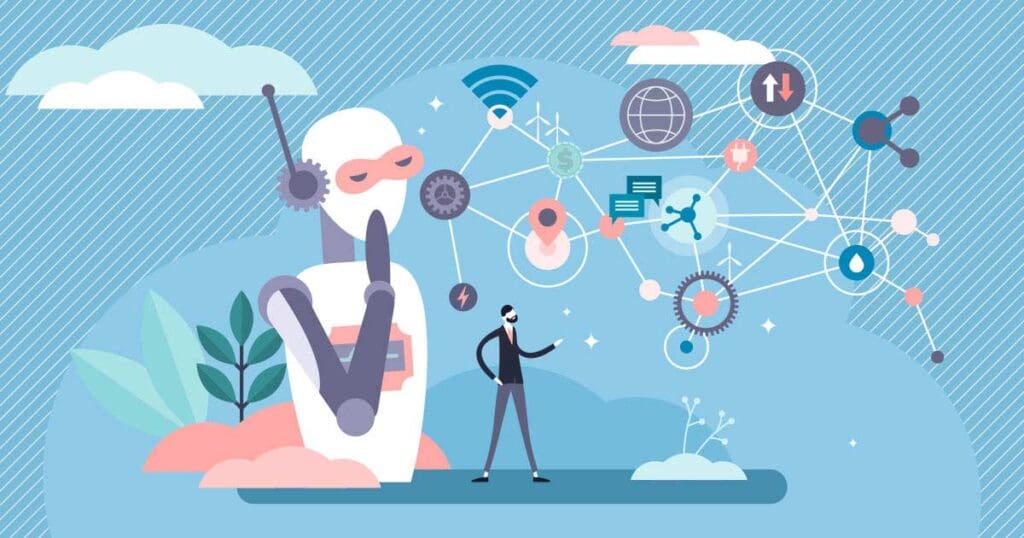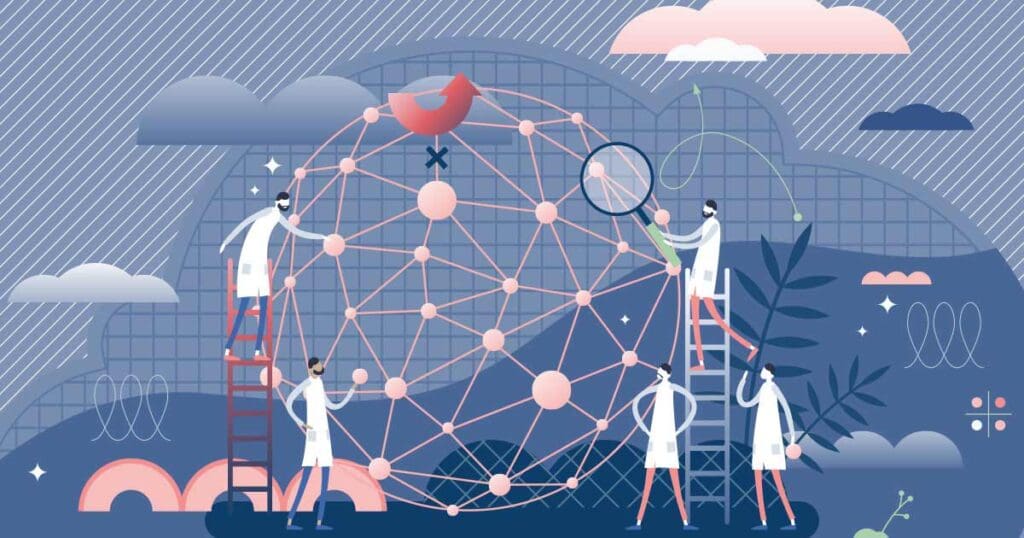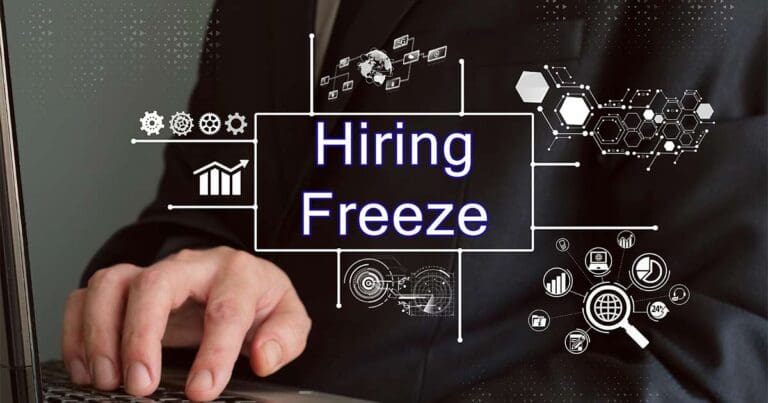AI Automation and the Future of Jobs

How AI Automation is Shaping the Future of Jobs
Like the shot heard ‘round the world, ChatGPT has commenced the race to the future of work powered through AI and automation.
As Mondo’s National Client Partner, I have worked with both candidates and clients seeking to implement AI into their businesses and workflows.
What can be done today, and where are we going?
How is AI automation used?
When we’re talking about AI in a business context, we are mainly talking about automation. AI is the next stage of the evolution of automation — applying computing power to automate not just repetitive, manual processes but in-office, modern creative work as well.
Automation is not new. We’ve been automating things—say, keeping track of the time—since the Egyptians automated the telling of time with their water clocks since 1500 BCE.
Our modern conception of automation became a focal point in the Industrial Revolution kicking off in the mid-19th century factory workers.
After WWII, we saw the introduction of what we would consider modern computing power applied to automating manufacturing production.
The term “automation” came into common parlance in 1947, when Henry Ford established an automation department to apply computing processes to his assembly line manufacturing.

The release of ChatGPT has put the thought in people’s minds that you could automate “knowledge work,” a term coined by management academic Peter Drucker in the 1950s to refer to what we would normally associate with office work—non-repetitive tasks that require divergent thinking to solve problems—creative work, in other words.
As AI evolves, it will continue to be applied to the automation of repetitive, manual processes and traditionally creative work.
What are the benefits of automation in business?
There are numerous benefits of using AI automation in business that lead to improved efficiency and accuracy as well as cost savings and enhanced customer experience.
Benefits of using AI automation:
- AI can increase efficiency
- AI can improve accuracy
- AI can enhance customer experience
- AI can lead to cost savings
- AI can increase scalability
- AI can improve safety
AI can increase efficiency
Every job, including more creative, office-based positions, has its share of repetitive, manual tasks.
The more time you free up through AI for your employees, the more time they can spend solving the larger problems affecting your business.
AI can improve accuracy
Pilots fly planes but mainly use autopilot for the majority of the flight.
Autopilot does not need to be perfect, it just needs to be successful enough to beat the average pilot, and allow human operators to save their mental energy for taking over navigation during the most creatively strenuous situations — say, landing a plane on the Hudson.
AI can enhance customer experience
I don’t know if you’ve heard this about customers, but they like things fast.
Luckily, we can apply AI and automation to customer points of interaction so rather than waiting on hold for 54 minutes to speak with a human, you can resolve your issues with an AI chatbot.
This is being done with the many AI chatbots that are on the market but imagine scaling that process to other areas of the customer experience, from search to pricing to product delivery.
AI can lead to cost savings
By off-loading work to AI, companies will be able to do more with fewer staff, saving on labor investments.
Not only that but in some cases, automated reports and system scans can spot and alert stakeholders to issues early on before they become costly mistakes.
i
AI can increase scalability
The greatest hindrance to scalability is complexity.
AI algorithms will be able to split the Gordian Knot of growth and execute, allowing your staff to monitor progress rather than completing tasks manually.
They can also inform better decision-making by creating recommendations based on Big Data sets that cannot necessarily be processed as quickly or efficiently as humans.
AI can improve safety
Using “computational rationality,” as AI scholar Daniel Susskind refers to AI, can ideally remove human bias or error from safety-critical situations, such as diagnosing whether a skin blemish is cancerous, to removing human bias from court decisions.

What are the disadvantages of using AI automation in business
There are several disadvantages to using AI automation in business like loss of jobs, AI bias, and a larger margin for error without human touch.
Top disadvantages of using AI automation in business:
Job loss
Susskind also writes about “technological unemployment,” or the mass unemployment of laborers caused by the use of AI to automate service workers out of the workforce.
This is a key area that not just businesses but policymakers will need to prioritize solving in the next 10-30 years.
Lack of creativity
A main selling point of AI is that it will allow workers to focus on more creative problem-solving.
A key risk is taking someone’s challenging, engaging job, taking away all the creative problem-solving, making it a game of watching algorithms run, and making sure they don’t break anything.
Use AI to upskill your workforce, not make them administrators.
AI Bias
AI is heavily dependent on the datasets used to create its algorithms, and depending on data with inherent biases will simply repeat patterns of bias and give the same faulty results.
Those implementing AI need to be cautious of those risks rather than blindly accepting a result.
Limited transparency
In the coming years, business leaders will be bombarded with AI solutions — and perhaps you already are!
It is key that decision-makers understand the underlying processes inherent in the creation of these algorithms to ensure the solutions are worth their price.
Technical limitations (AI is still evolving)
We’re still a long way from automating knowledge work.
The field’s applicability in business is still nascent, but that doesn’t mean you can’t start incorporating AI into your business.
How to incorporate AI automation into your business
Incorporating AI automation into your business can be done with the right strategies in place including speaking with AI and automation experts and hiring the professionals you need to manage and implement these new technologies.
Talk to AI automation experts
Talk to a seasoned consultant in the automation space; we staff automation consultants
in a variety of B2B technologies including ServiceNow, Salesforce, UIPath and more. There are many enterprise technical solutions on the market that can offer much of the automation promised in the future of AI.
Gain access to top AI talent
If you do decide on a technology solution, select the right staffing partner who can
connect you with top consultants nationwide for a smooth implementation. From discovery to implementation to adoption, there are senior consultants working daily in cutting-edge AI environments.
What jobs shouldn’t be replaced by AI?
Again, business leaders should focus on what tasks, rather than what roles, can be automated by AI, as there are some key subject matter areas that will still need a human touch.
In particular, creative roles such as Brand Managers and Content Strategists, highly technical roles such as Software Architects, or client-facing roles in Sales or Account Management will resist automation longer because of the higher level of creative problem-solving that AI is currently unable to replicate.
Examples of jobs that should not be replaced by AI:
- Brand Manager
- UX/UI Developer
- Ads Managers
- Digital Content Strategist
- Full-stack Developer
- DevOps Engineer
AI Automation and the future of work
Knowledge workers still have repetitive tasks that can be automated right now with currently existing technology.
Stephen Vanover, Domain Architect for Automation at Eversource Energy, says to start with, “The tasks that are typically associated with data input and output…oftentimes these are finance or HR teams that deal with high amounts of repetitive data.”
When considering AI solutions, remember the key is to free your workers from repetitive tasks so they can focus on solving problems for your business.
Looking to hire top-tier Tech, Digital Marketing, or Creative Talent? We can help.
Every year, Mondo helps to fill over 2,000 open positions nationwide.
Continued Reading on industry insights, tips, and strategies:
- Hiring and Recruitment Obstacles in 2023 & How to Overcome Them
- How Leadership Development Improves Employee Retention
- 8 Tips for Managing Former Peers as a New Manager
- Reasons New Hires Fail: Is Leadership to Blame?
- Top 7 Benefits of Building a Data Analytics Team for Your Business Growth
- 5 In-Demand Developer Roles Your Tech Team Needs
- How The Great Resignation Has Changed Staffing Forever
- Why Take-Home Assignments are the Biggest Mistake for Hiring Managers



